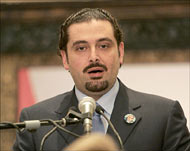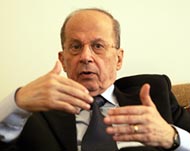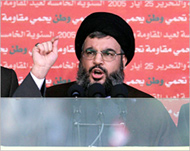Voting starts in the Lebanese capital
Lebanese began voting in Beirut with the son of slain former Prime Minister Rafiq al-Hariri set to triumph in the first general election in three decades with no Syrian troops in the country.

The polls mark a new era for Lebanon, taking place just a month after Christians and Muslims united in unprecedented protests that forced Damascus to bow to international pressure and end its 29-year military presence.
Armed police and soldiers guarded polling stations that opened across the capital at 7am. More than 400,000 people are eligible to vote in Beirut to choose 19 representatives to the 128-seat parliament.
The four-stage polls are the first since Syria in April ended its 29-year military presence in Lebanon.
Turnout
Reporting from a major polling centre in the Verdan area, Aljazeera’s Ghassan bin Jiddo, said the main challenge facing the Lebanese people would be the turnout of Beirut citizens.
Some have called for a boycott, while others have called for a high range of participation, he added.
Saad al-Hariri was the first person to cast his ballot. He urged Beirut citizens to show a high turnout, adding that their main purpose should be national unity.
Foreign observers
For the first time, foreign observers will monitor Lebanon’s polls, with a team of more than 100 led by the European Union.
 |
|
Saad al-Hariri’s list in Beirut does |
“The election is a special democratic accomplishment after the developments Lebanon has witnessed since the assassination of al-Hariri,” Prime Minister Najib Mikati said on Saturday.
Interior Minister Hassan al-Sabaa promised a vote free of
bias.
But the initial euphoria has given way to disenchantment
among ordinary Lebanese who have watched anti-Syrian opposition leaders revert to traditional electoral horse-trading, with opportunistic alliances effectively curtailing voter choice.
Forgone conclusion
Riding a wave of sympathy over his father’s 14 February
assassination, Saad al-Hariri is set to score a landslide in the
first round of voting spread by region over four weekends.
 |
|
There has been bickering |
For lack of challengers, the 35-year-old businessman’s ticket has already clinched nine of the 19 seats up for grabs in the capital, where there has been little campaigning and no electoral suspense.
Only a handful of pro-Syrian leftists and Islamist parties are competing with al-Hariri’s Future bloc in mainly Sunni Beirut.
The Sunni leader urged supporters not to be complacent.
“There are those who bet that voter turnout will be low on Sunday and that the battle is predetermined and there is no need to go to the ballot boxes,” al-Hariri said on Saturday.
“We have all to prove our loyalty to martyr Rafiq al-Hariri and vote heavily to stop any opposing candidate from winning.”
Elected by default
Seventeen candidates have already been automatically elected by default, including prominent opposition leader Druze MP Walid Jumblatt and close ally MP Marwan Hamadeh, who had accused the Lebanese-Syrian security services of an attempt against his life in October.
 |
|
Hizb Allah and Amal are likely |
In the second round of the polls in southern Lebanon a real battle is not predicted, where the pro-Syrian Shia Amal and Hizb Allah movements’s joint lists were due to retain control of parliamentary seats.
“We expect a low turnout in Beirut because there is no real rival list facing al-Hariri, and nine of the 19 seats have already been won by default,” Ziad Barud, head of the Lebanese Association for Democratic Elections, said.
“So the battle is really about trying to score a high turnout to show real legitimacy.”
Little competition
Despite the crucial importance of the polls, there has been little sign of an intense battle as many of Syria’s once-powerful allies have thrown in the towel and the opposition is widely expected to win the lion’s share of seats in parliament.
|
“Let every political force fight for its place and show its real weight” Ziad Barud, |
Jumblatt is expected to see his candidates sweep the board in his mountain strongholds of the Chouf and Aley-Baabda, southeast of the capital.
“The real challenges will be in the [Christian areas] of Jbeil-Kesrwan and the Metn [east and northeast of Beirut] in the third round of the polls and relatively in north Lebanon on the last round,” Barud said.
Electoral bickering started after a break among opposition ranks, especially among Christian parties and between Jumblatt and former exiled Christian General Michel Aoun.
Odd couples
Fresh from 15 years of exile in France after having waged a devastating but aborted “war of liberation” against the Syrians, Aoun is now forming alliances with pro-Syrian figures.
Jumblatt himself has forged links with Shia movements Amal and Hizb Allah.
“The opposition scored victories with Syria’s exit and other major demands, but now it appears as it is: a plural opposition. But this is OK because it is healthy and democratic,” Barud said.
He added: “Let every political force fight for its place and show its real weight.”
On Saturday, Aoun outlined his faction’s vision for both the present situation and policies for the future.
On political matters, the Free Patriotic Movement underscored the need for reviving Lebanese constitutional institutions on the basis of a new electoral law and separation of powers between the executive, legislature and judiciaries.